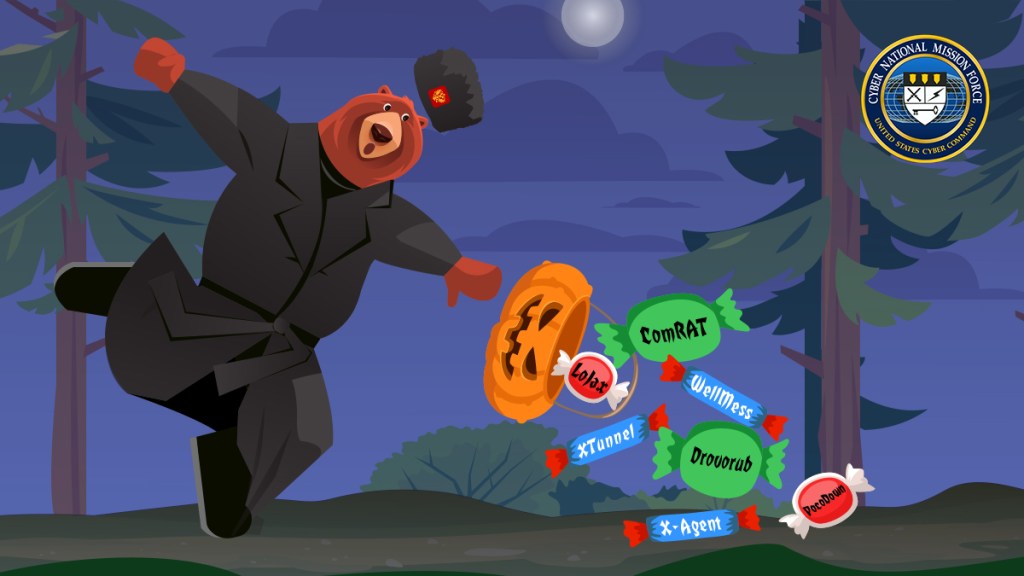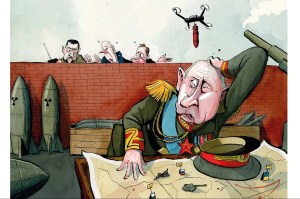After 20 years, a peak of 100,000 troops and trillions spent, the American military was unable to defeat the Taliban or even stop them from running half of Afghanistan. But that isn’t the only war America has been losing. We’re also losing the Meme Wars.
That’s the lesson from a truly ghastly discovery by the intrepid reporters at VICE, who obtained 23 pages of internal documents from the Pentagon about an anti-Russia meme it deployed last October.
The meme (see above) in question was created by US Cyber Command’s Cyber National Mission Force, as part of its invisible war against Russian hackers. Their goal: expose the fact that Russia has hackers (gasp!) and make them look dumb in the process.’We want something that’s in a PowerPoint their boss sees and he loses his shit on them,’ one US official said.
No artifice was spared as the DoD’s meme masters carried out their work. What creature would best serve as a metaphorical representation of Russia? A bear, of course! But wait: bears are formidable animals, and they didn’t want Russia to look tough and dangerous. They couldn’t use Winnie the Pooh; everybody associates him with China now.
In a feat of tactical, nay, strategic brilliance, America’s cyber elites figured out the solution: portray Russia as a bear, but make the bear look silly! As one defense official later leaked to Cyberscoop, ‘Russia hates to be seen as cuddly or cozy so we want to tick them off.’ Wait, shouldn’t elite cyberoperatives not be babbling to the press about what they are doing? Oh well! Having chosen their plan of attack, it took defense officials a mere 22 days to propose a graphic, create it, get through the layers of necessary approval and finally deploy it like digital white phosphorus against the enemy. Every part of the plan was finely tuned; operatives required special commander permission for every image, every tweet, every retweet even.
And so, America hit Russia with its deadliest blow since Operation Barbarossa: a cartoon of a bear tripping while trick-or-treating.
An implant dropper dubbed #ComRATv4 recently attributed by @CISAgov and @FBI to Russian sponsored APT, Turla. It was likely used to target ministries of foreign affairs and national parliament.
@CNMF_CyberAlert continues to disclose #malware samples on: https://t.co/fSgk1xpG8t pic.twitter.com/c2jmozTAyB— USCYBERCOM Cybersecurity Alert (@CNMF_CyberAlert) October 29, 2020
Hahahahaha…ha…ha…wait, that’s it? How does that even make sense? If the idea is that Russia is launching deliberate cyberattacks on the West, why is the bear stumbling? Doesn’t that suggest Russia’s malware is spread by accident instead? If that’s the case, do we really need a special arm of the Pentagon spending a zillion dollars a year to stop them?
How successful was America’s meme offensive? Well, as of this writing, the meme has 421 likes and 257 retweets. Not only is that one-tenth as much engagement as any random @dril tweet, it’s also less than a tweet on Wednesday making fun of the Pentagon for how stupid its meme was.
The Pentagon took 22 days to design a meme and then wrote a report. Behold the meme that will bring down Putin
They didn't want the Russian bear to look cool so they made him clumsy, those masters of the dark arts
Now you see why they lose to the Taliban https://t.co/ulRGLA1nKE pic.twitter.com/lC3C2Rcjci
— Richard Hanania (@RichardHanania) March 24, 2021
In a fit of understatement, the DoD’s internal report notes that ‘The graphics may not be shaping adversary behavior.’ Like effective military forces in real life, effective memes rely on agility, precision, and proper knowledge of the enemy. So it’s fitting that a lumbering, bloated bureaucracy-with-bombs like the American armed forces couldn’t produce a good meme to save their lives or the lives of half a million Iraqis. Almost certainly, they could have hit Russia with far better memes by just paying a few 4chan posters to produce them in exchange for Steam games and chicken tendies.
Cockburn finds all this delightful. Most high-profile Defense screw-ups kill thousands of people. The only thing the silly bear can kill is the Pentagon’s credibility, and fortunately that’s already shot.


















